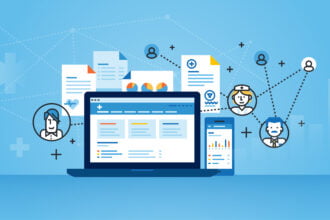The COVID-19 outbreak of the past two-plus years introduced the possibility of a worldwide pandemic to many people. We spent two years trying to teach people how to avoid getting infected, but have since seen much more drastic changes to our healthcare system.
At first glance, conditions such as these might seem like once-in-a-lifetime events. However, global pandemics are far more common than we think, with research indicating that in any given year, there’s approximately a 2% probability of a COVID-like pandemic occurring.
Essentially, this means that a person born after 2000 has a 38% chance of seeing another dangerous outbreak. As far as pandemics go, the question is “when,” not “if.” The good news is that healthcare has made significant leaps due to the stress of the past two years, so that we’re now better prepared for the next one.
Revamped Logistics for the Pharma Supply Chain
Logistics seems like an odd place to begin when discussing healthcare. However, COVID-19 alerted us of the role logistics, and deliveries play in ensuring vaccines and medicines arrive safely. The COVID vaccines posed numerous challenges.
From extreme storage requirements to mass production to closures and container shortages at the ports, logistics providers turned to novel solutions to ensure consumers received vaccines on time. For instance, IoT-driven condition monitoring devices from Logmore have helped vaccine manufacturers and distributors ensure shipments were stored in optimal conditions.
The data from such devices helps providers to ensure the medicines we consume are safe. They also help pharmacies predict their storage and inventory needs. For instance, a rise in temperature data alerts pharmacies of potential damage down the road. By reacting proactively to such situations, every stakeholder in the logistics chain ensures consumers are safe.
Other advances in logistics include contactless deliveries and enhanced shipment tracking. For instance, you can track the position of your shipment and verify its origin. Medicine packages with QR codes help you trace the origin and safety of the medicines you consume, with some governments, such as the EU mandating these standards.
The result is a safer patient experience and optimal use of medicines and vaccines.
More Accurate Infection Spread Forecasts
COVID-19 introduced the phrase “contact tracing” into our daily vocabularies. Governments used advanced technology to trace the spread of the coronavirus in communities and gathered data to sequence the disease’s variants. The use of AI in modeling disease spread is now routine, thanks to the stress that COVID-19 placed on manual modeling techniques.
Epidemiological studies traditionally focused on statistical models derived from past pandemics. However, by training AI in these historical data patterns, scientists have discovered novel ways of reacting to disease outbreaks. A lot of the behind-the-scenes work in reacting to the outbreak also involved AI. For instance, social distancing policymaking, drug discovery, clinical research, and socioeconomic impact studies leaned heavily on AI use.
In a research paper published in Intelligent Medicine, scientists from Temple and Cornell documented the benefits of using “a metapopulation susceptible-exposed-infectious-removed (SEIR) model based on fine-grained and dynamic mobility networks to investigate the spread of COVID-19.” This allowed officials to build algorithms that took into account complex factors such as how susceptible to infection people are, what behaviors they might do to spread the virus while asymptomatic, and what happens when they receive various types of treatment.
Undoubtedly, the next pandemic will bring new challenges. However, AI usage during the COVID-19 pandemic has left our world better prepared to react proactively to new diseases. Not only can authorities diagnose novel viruses quickly, but they can also trace and isolate viral strains before they cause an epidemic.
Advances in natural language processing and statistical modeling techniques have helped AI algorithms model outbreaks with precision. These advances were evident in the early days of COVID. For instance, AI company Metabiota alerted its clients of a possible outbreak in Wuhan, China on December 30, 2020, nine days before the WHO acknowledged the outbreak.
Metabiota played a pivotal role in projecting infection numbers that informed public policy. On February 25, 2020, the company’s models predicted 127,000 worldwide cases of COVID, a number that was overestimated by only 30,000. The model also predicted that the disease would spread rapidly to China, Italy, Iran, and the United States.
All these predictions were inside the margin of error and helped governments ensure their citizens were safe. By the time the next pandemic occurs, advanced technological innovations such as this will undoubtedly keep our societies safe.
Remote Healthcare as the Standard
COVID-19 jeopardized human-to-human contact to a great extent. healthcare providers ran short of PPE equipment and masks. Contactless everything was in huge demand, from payments to healthcare. How does one treat patients remotely, though?
Advances in robotics and telehealth are making this dream a reality. While fully remote healthcare isn’t possible, there’s no denying that delivering healthcare remotely is far easier these days than just five years ago. Hospitals and pharmacies are less strained as a result, and doctors can prioritize medical resources better.
As a result, patients with severe diseases are more likely to receive treatment on time, while those in remote areas are less likely to suffer, due to location-based issues. Robotics might soon solve issues such as drug deliveries (through drone use) and medical diagnosis, through personal wearable devices.
When combined with the other advances in medicine, we are undoubtedly safer and better positioned to deal with the next pandemic.
A Resilient Stance
The thought of another pandemic might create a spike of fear. However, technological advances can potentially squash an outbreak before it spreads. For instance, we have learned to live with the flu, a pandemic that first broke in 1918. Advances in medicine have normalized the disease.
Advances in technology might help us proactively mitigate the next pandemic’s risks and minimize disruption. Only time will tell how the world will cope with the next health crisis, but there’s no doubt that we’re better prepared.









